(PTY) LTD V MOHLOMI NTSANE & 5 ORS LC.REV_.114.12
advertisement
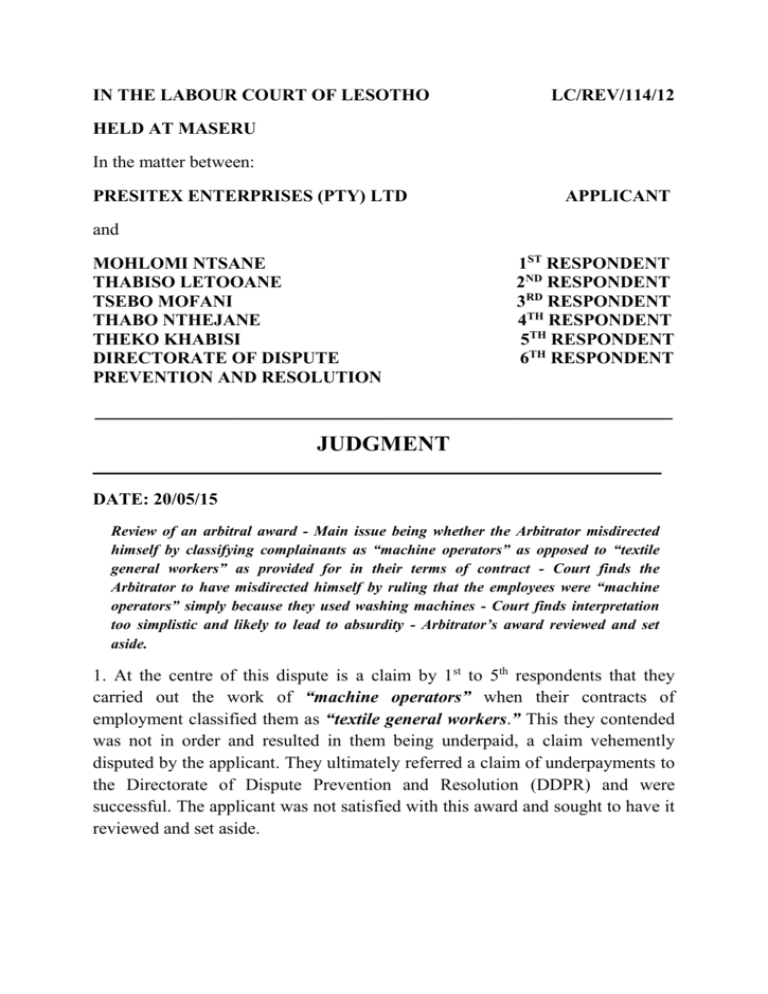
IN THE LABOUR COURT OF LESOTHO LC/REV/114/12 HELD AT MASERU In the matter between: PRESITEX ENTERPRISES (PTY) LTD APPLICANT and MOHLOMI NTSANE THABISO LETOOANE TSEBO MOFANI THABO NTHEJANE THEKO KHABISI DIRECTORATE OF DISPUTE PREVENTION AND RESOLUTION 1ST RESPONDENT 2ND RESPONDENT 3RD RESPONDENT 4TH RESPONDENT 5TH RESPONDENT 6TH RESPONDENT ________________________________________________________________ JUDGMENT _______________________________________________________________ DATE: 20/05/15 Review of an arbitral award - Main issue being whether the Arbitrator misdirected himself by classifying complainants as “machine operators” as opposed to “textile general workers” as provided for in their terms of contract - Court finds the Arbitrator to have misdirected himself by ruling that the employees were “machine operators” simply because they used washing machines - Court finds interpretation too simplistic and likely to lead to absurdity - Arbitrator’s award reviewed and set aside. 1. At the centre of this dispute is a claim by 1st to 5th respondents that they carried out the work of “machine operators” when their contracts of employment classified them as “textile general workers.” This they contended was not in order and resulted in them being underpaid, a claim vehemently disputed by the applicant. They ultimately referred a claim of underpayments to the Directorate of Dispute Prevention and Resolution (DDPR) and were successful. The applicant was not satisfied with this award and sought to have it reviewed and set aside. GROUNDS OF REVIEW 2. The applicant is challenging the learned Arbitrator’s decision on the grounds that he misdirected himself in finding as he did that the 1st to 5th respondents had been underpaid. It was its case that the learned Arbitrator ignored the terms of the employees’ contracts of employment which clearly stipulated that they were engaged as “textile general workers.” Applicant’s Counsel further argued that the crux of the dispute was underpayments, and not whether or not the 1st to the 5th respondents were “machine operators.”To this end, he submitted that the learned Arbitrator dealt with an issue that was not before him and thereby committed a reviewable irregularity. 3. Counsel further submitted that the award was so grossly unreasonable as to warrant an inference that the learned Arbitrator failed to apply his mind to the evidence tendered on behalf of the applicant particularly the contracts of employment. As far as he was concerned, he failed to consider such evidence or to attach the necessary weight to it. He contended that no Court of law properly constituted could arrive at such a decision and prayed that the award be corrected and set aside, and further that the respondents pay costs of suit. 1ST TO 5TH RESPONDENT’S CASE 4. In reaction to the applicant’s claim, Counsel for the 1 st to the 5th respondent argued that the founding affidavit did not disclose a ground of review but of appeal when this Court does not have jurisdiction to entertain appeals, and further that the applicant did not show how unreasonable the learned Arbitrator had been. He submitted that it was only proper for the learned Arbitrator to have first ascertained whether the said employees were “textile general workers” or not in order for him to be able to determine whether they were underpaid or not. He further pointed out that what the learned Arbitrator did was not to interprete the 1st to the 5th respondent’s contracts but to venture into facts that were relevant to the issue. THE COURT’S VIEW 5. It is common cause that the 1st to the 5th respondents were working in the Washing Department of the applicant’s firm. It was their case that since they operated washing machines, they ought to be classified as “machine operators” and not as “textile general workers” as reflected in their contracts of employment. This situation, they claimed, resulted in them being underpaid from the year 2010 to 2011 when they referred their dispute to the DDPR. 6. As it were, the learned Arbitrator’s decision was premised on a finding that by virtue of operating washing machines the 1st to 5th respondents were machine operators. A glance at the definition of “machine operator”: it is described in the Labour Code Wages (Amendment) Notice, 2011 as “... a person who operates machinery within the clothing, textile and leather manufacturing sector …” (the Notices are issued out annually). This definition, unfortunately, does not carry us far enough and we have no alternative but to look beyond the Labour Code for solace. 7. This approach is supported by none other than Section 4 of the Labour Code Order, 1992 which provides that where there is ambiguity, provisions of the Code and of any rules and regulations made thereunder shall be interpreted in such a way as more closely conforms to provisions of Conventions and Recommendations of the International Labour Organisation (ILO). According to the ILO International Standard Classification of Occupations (ISCO), jobs are divided into ten major groups viz., 1- Managers 2- Professionals 3- Technicians and associate professionals 4- Clerical support workers 5- Service and sales workers 6- Skilled agricultural, forestry and fishery workers 7- Craft and related trades workers 8- Plant and machine operators, and assemblers 9- Elementary occupations and 10-Armed forces occupations 8. According to ISCO, plant and “machine operators” comprise: Mining and mineral processing plant operators Metal processing and finishing plant operators Chemical and photographic products plant and machine operators Rubber, plastic and paper products machine operators Textile, fur and leather products machine operators Food and related products machine operators Wood processing and papermaking plant operators Other stationary plant and machine operators A “textile general worker” is on the other hand defined in terms of the Labour Code Wages (Amendment) Notice, 2011 as: “a person employed in the clothing, textile and leather manufacturing sector doing all kinds of tasks other than machine operator, security work, watchmen, administration, clerical work as well as messengers and gardeners.” 9. The basic criteria used to categorise jobs are the skill level and specialisation or training required to competently perform the tasks and duties of the occupations. A referral to the above grouping is meant to illustrate that by no stretch of imagination can a person who uses a washing machine be classified as a “machine operator” unless it is somehow qualified. In our opinion, the learned Arbitrator stretched the concept of “machine operator” too far. The position would have been different if he had ascertained that the washing machines in issue were not run-of-the-mill washing machines. It is clear that an in depth investigation was needed before he could make his ruling. 10. Arbitrators have, among others, an investigative or inquisitorial role. Lesotho is no exception, hence the Labour Code (Conciliation and Arbitration Guidelines) Notice, 2004 provide in Section 3 (2) (b) that “conciliation” includes fact finding. An example given in Section 6 (4) of this Notice is where parties dispute whether the employee works in a dangerous area where the dispute revolves on protective clothing. It is our considered opinion that the case before us was one where a fact finding exercise on the type of the washing machines in issue ought to have been undertaken to establish whether they could be categorised as “machines” under the industrial setting. 11. The learned Arbitrator ought to have gone deeper and probed what kind of washing machines the claimants were using. His statement in paragraph 12 of his award reflects how simplistic his definition of “machine operator” was. He indicated therein that:In the present case it is not in dispute that applicants were working and using a washing machine to wash clothes. The machine might have been manually or automatically operated but none the less factually the person who turns on the machine is in actual fact effect operating the machine. This is the reason why even a telephone receptionist working or operating a telephone switchboard is called an operator (emphasis mine) because such a person is in control of the functions of the machine, namely, the switchboard. The machine cannot switch itself on; there is a person who controls it. It is clear in this case that clothes are washed; chemicals are put into the machine and taken out to be dried. So in effect applicants are operating the washing machine.” 12. “Machine operator” is a concept used within an industrial setting and must be understood as such. It refers to the operation of a machine in the industrial context or setting. This categorisation of jobs is used, inter alia, to determine remuneration. The learned Arbitrator considers a Switch Board Operator as a “machine operator.” This in our view is not what the legislature intended when it adopted the concept of “machine operator” in the Labour Code Order, 1992. If we were to go by his construction of a “machine operator,” even employees who operate computers would be categorised as “machine operators.” This would cover almost every employee as computers are used across the broad spectrum of work and would have very absurd results. It just occurs to me that even an employee who uses a food processor, a hoover or a calculator would claim to be a “machine operator.” 13. The purpose of organising jobs into clearly defined sets of groups according to the tasks and duties undertaken as done by ISCO is a tool that is used to evaluate jobs and to give appropriate remuneration. The information serves as a valuable statistical tool and is also useful for the development of vocational training programmes and guidance. The learned Arbitrator had to consider the definition of a machine within a factory context. Machines take many forms. In the ordinary sense, a washing machine cannot be classified as a machine in the industrial setting unless it is qualified. THE CHALLENGE TO THE ARBITRATOR’S DECISION - WHETHER IT IS REVIEWABLE IRREGULARITY/REASONNABLENESS 14. The applicant is also challenging the irregularity of the learned Arbitrator’s decision. It is one of his review grounds that the learned Arbitrator’s decision is so irrational and or irregular that no Court of law properly constituted would have come to the kind of decision that he arrived at on the facts and evidence that was before him. A pause to determine what constitutes irregularity: Schreiner J., expressed the principle in Goldfields Investment Ltd and Another v City Council of Johannesburg and Another, 1938 TPD 551 as follows:That it is not merely a high - handed or arbitrary conduct which is described as gross irregularity; behaviour which is perfectly well - intentioned and bona fide, though mistaken, may come under that description. The crucial question is whether it prevented a fair trial of the issues. If it did prevent a fair trial of the issues then it will amount to a gross irregularity. 15. This principle was also elucidated in Ellis v Morgan; Ellis v Dessai 1909 TS 576. Both cases make it plain that the crucial enquiry is whether the conduct of the decision- maker complained of prevented a fair trial of issues. The complaint must be directed at the method or conduct and not the result of the proceedings. Determining whether the decision - maker committed a gross irregularity will inevitably require the reviewing Court to examine the reasons given for the award. It is trite that judicial review is concerned not with the decision but with the decision-making process - See Herbstein & Van Winsen in the Civil Practice of the Supreme Court of South Africa, 4th ed., 1997 at p. 929. 16. The applicant is further challenging the reasonableness of the Arbitrator’s decision. A matter is reviewable if the rationality of the presiding officer is put to question. It was held in Sidumo and Another v Rustenburg Platinum Mines Ltd and Others (2007) 28 ILJ, 2405 (CC) that an award is reviewable if the decision reached by the Arbitrator was one that a reasonable decision-maker could not have reached. The Supreme Court of Appeal of South Africa set out the test for a review based on reasonableness in Foodcorp (Pty) Ltd v Deputy Director-General, Department of Environmental Affairs and Tourism and Others, 2006 (2) SA 191 (SCA) at para. 12. In determining what decision a reasonable decision-maker could make, the Court held that: One does not need to understand the complex process, mathematical or otherwise... to realise that at least some of the results produced by the simple application of the formula were irrational and inexplicable and consequently unreasonable. 17. As pointed out earlier in the judgment, the learned Arbitrator’s definition is far -reaching and would produce absurd results leading to too many jobs being classified as “machine operators” and ultimately defeating the purpose of the legislative framework. The determining factor ought to have been the nature of 1st to 5th respondent’s work coupled with the kind of the gadgets they operated. So many gadgets can be classified as machines, including a cell phone. PURPORTED FAILURE BY THE ARBITRATOR TO APPLY HIS MIND 18. One of applicant’s grounds of review was that the learned Arbitrator failed to apply his mind to the case that was before him. The concept of “a failure to apply one’s mind” was considered in Hira v Union Government (Minister of Justice) 1929 AD 281 at 285 as including: the misconstruing of evidence, taking into account facts that are not relevant to the issues to be considered and a failure to take into account relevant facts such that it renders the result of the entire process inappropriate and unreasonable. 19. This exposition was confirmed by Corbett JA., in Johannesburg Stock v Witwatersrand Nigel Ltd 1988 (3) SA 132 (AD) at 152 C-D when he explained the concept of “a failure to apply one’s mind” as: “[p]roof, inter alia, that the decision was arrived at arbitrarily or capriciously or mala fide or as a result of unwarranted adherence to a fixed principle or in order to further an ulterior or improper purpose; or that the [presiding officer] misconceived the nature of the discretion conferred upon him and took into account irrelevant considerations or ignored relevant ones or that the decision was so grossly unreasonable as to warrant the inference that he had failed to apply his mind to the matter in the manner aforestated.” 20. In our opinion, the learned Arbitrator ignored a relevant consideration, which was to ascertain whether the washing machines the complainants were referring to could be classified as “machines” for purposes of the Labour Code Wages Notices. A reasonable decision-maker would have appreciated that a washing machine, unless otherwise qualified, is not a machine as envisaged in the industrial sense. We feel that the learned Arbitrator failed to apply his mind to the concept of “machine operator” and therefore find the matter reviewable. WHETHER THE ARBITRATOR EXCEEDED HIS POWERS 21. It was applicant’s further ground of review that the learned Arbitrator went beyond his mandate by determining whether or not the 1st to the 5th respondents were “machine operators” or “textile general workers.” We do not agree with applicant’s Counsel in this regard. In order to ascertain whether the 1st to the 5th respondents were underpaid the learned Arbitrator had to determine what work they did. We must appreciate that at the crux of the dispute was whether 1st to 5th respondents were entitled to be paid as “machine operators” or as “ general workers.” DETERMINATION 22. On the above analysis, we come to the following conclusion; i) That the learned Arbitrator erred in finding that the 1st to the 5th respondents were “machine operators” and not “general workers” leading to his conclusion that they were underpaid; ii) That the award of the DDPR in A0821/12 is reviewed and set aside; and iii) There is no order as to costs. THUS DONE AND DATED AT MASERU THIS 20TH DAY OF MAY, 2015. F.M KHABO PRESIDENT OF THE LABOUR COURT (a.i) S.KAO ASSESSOR M. MOSEHLE ASSESSOR I CONCUR I CONCUR FOR THE APPLICANT: ADV., R. SETLOJOANE - PHAFANE CHAMBERS FOR THE 1st TO 5th RESPONDENTS: ADV., M.S. RASEKOAI - PHOOFOLO CHAMBERS
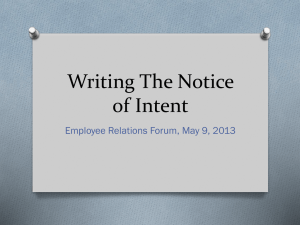
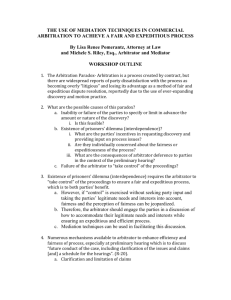

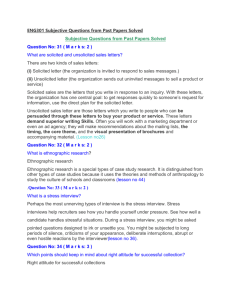

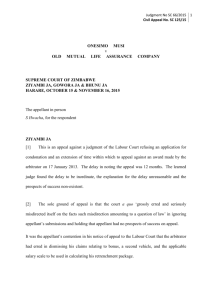

![Karim v Poche Engineering Services Pty Ltd [2013] NSWWCCPD 24](http://s3.studylib.net/store/data/006688889_1-34758331084196ec0e7f246a7cba4559-300x300.png)